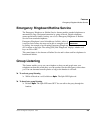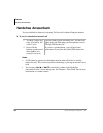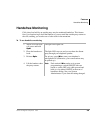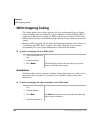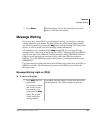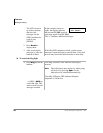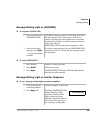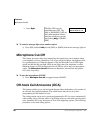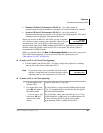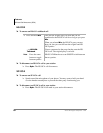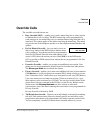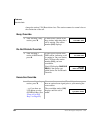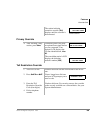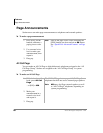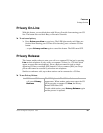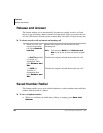
Features
Off-hook Call Announce (OCA)
Strata DK Digital Telephone 6/00 61
♦ Handset Off-hook Call Announce (HS-OCA) – lets callers make an
announcement through the handset (or headset). No special hardware is required.
♦ Speaker Off-hook Call Announce (SP-OCA) – lets callers make an
announcement through the speaker of an off-hook, busy digital phone. The called
telephone must be equipped with optional hardware.
When you receive an HS-OCA call while you are on another
call, you hear a short warning tone (optional), followed by an
announcement. You are the only one who hears the tone/
announcement. The station [
210] sending the HS-OCA is displayed on your LCD.
Stations in the DND mode cannot receive OCA calls unless the calling station is
programmed for DND Override.
While on a speaker OCA call,
0LF and 0LFURSKQ&XWRII can be used to prevent an
OCA caller from listening to your conversation with the original party (see
“Microphone Cut-Off” on Page 60).
➤ To make an OCA call (Voice First Signaling)
➤
Lift the handset and dial the [DN]. You hear a single tone (optional) or nothing
and can talk to the station (Automatic OCA).
Note If you receive busy tone, press to OCA the station
and talk. An optional tone is heard at the busy station,
indicating that you are connected on an OCA call.
➤ To make an OCA call (Tone Signaling)
1. Lift the handset and
dial the [DN].
You may hear busy or ring tone.
2. If you hear busy tone,
press
and speak to
the called station
...or if you hear a ring
tone, press
and
speak to the called
station.
If you hear busy or ring tone after dialing the first digit
(2 or 1), disregard the tone and dial the second digit to
OCA the called telephone.
If you still hear a busy tone after dialing 21 or 12, the
called telephone is either busy on a speakerphone call
or does not have the OCA option set in system
programming. Either condition blocks OCA.
NO. 204
210 BUSY OVRD
NO. 203
205 BUSY OVR



